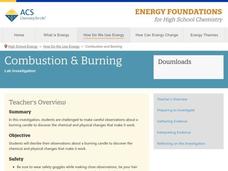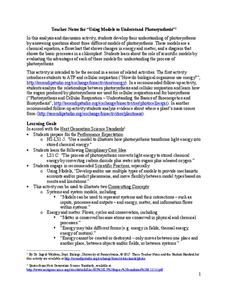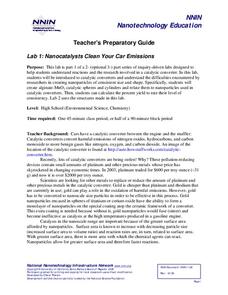American Chemical Society
Exothermic, Endothermic, and Chemical Change
Scientists can't observe bonds breaking or forming, so how do they distinguish between exothermic and endothermic reactions? Young scholars complete two experiments to do just that. They monitor temperature change and calculate the...
Royal Society of Chemistry
Mass Changes in Chemical Reactions—Microscale Chemistry
What better way is there to introduce conservation of mass than a few simple experiments? Young chemists conduct two chemical reactions, take the masses of reactants and products, then compare their results to determine...
Teach Engineering
Package Those Foods!
Designing the right package — it's more than a pretty picture. Challenge small groups to design a food package. They must consider the type of food they are packaging and the package's ability to control the physical and...
American Chemical Society
Entropy and Enthalpy Changes
My room isn't messy — it's a scientific experiment in entropy! Scholars investigate entropy, enthalpy, and spontaneity through a guided procedure and set of questions. The lesson connects the Second Law of Thermodynamics, energy...
It's About Time
Chemical Names and Formulas
Abracadabra! Provide your class with the tools to perform a chemical "magic show" as they predict the charges of various ions, determine ionic compound formulas, and make observations to determine when a chemical reaction between...
American Chemical Society
The Energy Efficiency of Heating Water
Can a small change in laboratory procedures save energy? Scholars test three different methods for heating water in a science lab. Then, they calculate the energy efficiency for each and compare them to determine which uses the least...
American Chemical Society
Combustion and Burning
On Earth, a candle flame points up, but on the International Space Station, it forms a sphere. Young scientists practice their skills by recording observations before, during, and after a candle burns. Chemical and physical...
NASA
Ripening of Fruits and Vegetables
How long do fresh foods last in space at the International Space Station? Which foods perish quicker than others? How can astronauts preserve their foods to make them last longer in space? Young scientists test the rates at which...
Serendip
Using Models to Understand Photosynthesis
Is your class in the dark about photosynthesis? Shed some sunlight on an important biological process with a thoughtful activity. After answering questions to help determine their level of knowledge, learners work with chemical equations...
American Chemical Society
The Energy of Evaporation
Do all liquids evaporate at the same rate? Young scientists observe the evaporation rate of three different liquids. They measure the time, the temperature, and the change in energy. After comparing the chemical formulas, scholars...
Baylor College
Fuel for Living Things
During a three-part lesson, learners make a cabbage juice pH indicator and use it to analyze the waste products of yeast after feeding them with sugar. The intent is to demonstrate how living organisms produce carbon dioxide, which is...
Discovery Education
School of Rock
Why do rocks break down over time? Learners explore this concept by simulating physical and chemical weathering of different types of rocks. They use an abrasive to demonstrate physical weathering and acid to demonstrate chemical...
Curated OER
Weathering Lab
Assist your middle school class with one of the most inclusive weathering and erosion labs available. Individuals use sugar cubes and alka-seltzer to demonstrate the process of physical and chemical weathering. They sketch results...
NOAA
The Incredible Carbon Journey: Play the Carbon Journey Game
Class members explore the carbon cycle in the final installment of the 10-part Discover Your Changing World series. They play a simulation game where they walk through the steps carbon takes as it cycles through the different layers...
Exploratorium
Indicating Electrolysis
Sure, your learners know water is made up of two molecules, but watching them separate helps the class see the construction like never before. This resource provides directions on how to build a simple electrolysis device using a...
American Chemical Society
Gas Sudsation
Bring out some bubbly! Individuals perform the classic baking soda and vinegar experiment with a twist. Learners add a drop of dish detergent to make the bubbles last longer. They vary the amount of baking soda and vinegar in an effort...
Integrated Physics and Chemistry
Law of Conservation of Matter
Does mass change during a chemical reaction? Demonstrate the Law of Conservation of Matter while encouraging class members to be creative with a two-part lesson. First, learners use Alka-Seltzer® tablets and water to demonstrate the...
NOAA
Climate Is Our Friend…Isn’t It?: Make an Extinction Polyhedron
Climate affects populations in different ways. Scholars research extinct organisms and mass extinctions in part three of the 10-installment Discover Your Changing World series. They create graphic organizers, then fill in the...
NOAA
Please Pass the Salt
Salinity is the focus of two experimenters that work to answer the question, How does salt change the physical properties of water? Super scientists compare the freezing rate of salt and fresh water, combine the two waters to...
Howard Hughes Medical Institute
Winogradsky Columns: Microbial Ecology in the Classroom
Winogradsky columns are ideal for observing the role of bacteria and other microorganisms in an ecosystem. This student activity guide is complete with data tables for observations and analysis questions for processing what was observed....
Curated OER
M&M Science and Math
A series of math and science activities feature M&M's® as manipulatives to help kids work through equations. The resource includes exercises on finding averages, percent of compositions, moles in chemical reactions, genotypes and...
Serendip
Photosynthesis and Cellular Respiration
How does energy from the sun make plants grow? Scholars move step by step through the processes that promote plant propagation during a detailed lesson. The resource illustrates ADP production and hydrolysis, then allows learners to...
National Nanotechnology Infrastructure Network
Lab 1: Nanocatalysts Clean Your Car Emissions
What a big job for such a small particle. Young scientists learn about the role of nanoparticles in catalytic converters for cars. They conduct an experiment to create alginate-MnO2 catalytic spheres.
Teach Engineering
Making Model Microfluidic Devices Using JELL-O
Nothing flows like J-E-L-L-O! In the final portion of a four-part series, pupils create scale models of microfluidic devices out of gelatin and bendable straws. They use their devices to test various flow rates in the delivery of...
Other popular searches
- Physical and Chemical Changes
- Chemical Changes in Matter
- Physical Chemical Changes
- Chemical Changes in Rocks
- Chemical Changes Rust
- Matter Chemical Changes
- Chemical Changes Indicators
- What Are Chemical Changes
- Rates of Chemical Changes
- Chemical Changes Rusting
- Chemical Changes of Matter
- Physical/chemical Changes























